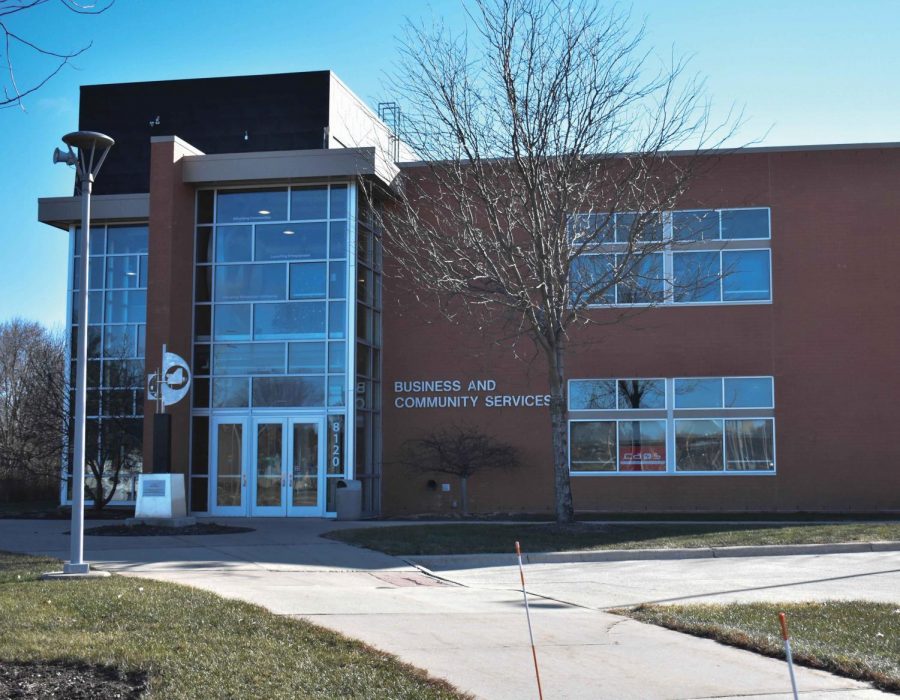Institute helps clients plan and strategize
Founded in 1987, the Institute for Decision Making is housed in the Business and Community Services building.
Nov 29, 2018
Those who dare venture beyond the beaten path of UNI’s campus and wander south of University Avenue will find the Business and Community Services building. On the first floor is the John Pappajohn Entrepreneurial Center, inside of which operates the little-known Institute for Decision Making (IDM). The organization has been active for over 31 years.
The Institute for Decision Making started back in 1987 during the farm crisis. At the time, Iowa Governor Terry Branstad decided to give funds to all three state universities so they could help communities in need through economic development. Originally, the institute was headed by Robert Waller, the dean of the College of Business.
“We’re basically consultants here at [UNI] that help those communities and those organizations around Iowa with planning such as strategic planning and research,” said IDM director Andrew Conrad.
IDM works closely with faculty, employs students and even sometimes helps students with their projects. For example, IDM has been working with professor of mathematics Mark Ecker since approximately 2000 on an annual project IDM does for the state of Iowa and the Iowa Workforce Development. The institute also regularly works with students from the geography department.
“We’re taking that expertise not only that of our staff has but also that of others in the university, whether it’s other programs like ours, faculty members and then also students,” Conrad said. “Also, by doing that, we’re helping faculty with opportunities to research and stuff like that. That helps with their academic endeavors. And with students — there’s a lot of our former students that worked with us that are now in our field that work in economic development.”
Since its inception, IDM has helped over 850 organizations and communities, working with at least one organization in all 99 Iowa counties. Their most common type of client is a small community’s economic development organization. Many of these communities continue to work with IDM on and off for decades.
Conrad admits that determining IDM’s success with helping a client can sometimes be a challenge.
“In economic development, often the focus is on jobs and capital investment,” Conrad said. “But for us, particularly on the planning side, it’s more our clients created a strategic plan that meets their needs. Then, later down the road, are they successfully implementing it? Those are the big measures that we focus in on.”
Conrad considers planning to be the gateway into the work IDM does. They also help their clients with researching, solving organization issues, marketing and developing marketing plans.
Although headquartered in Iowa, IDM has worked all over the country, including Minnesota, Wisconsin and Kansas City. IDM’s community clients report 1,500 to 2,000 new jobs each year because of IDM’s assistance, according to IDM’s annual report to the Board of Regents. IDM has also trained over 950 economic development professionals.
“We’ve done strategic planning for both the city of Waterloo and Cedar Falls,” Conrad said. “So, in total, probably 20 plus organizations over the years that we’ve worked with [in the Cedar Valley]. We facilitated a UNI strategic planning process, which was done two years ago. We just helped the College of Business with their strategic plan. We’ve helped the athletic department here at UNI with their strategic plan. Obviously, being local, we do a lot of work here, and plus being at UNI, we do a lot of work where we can.”
In the Cedar Valley alone, IDM has helped Cedar Falls Community Main Street Program, the Waterloo Main Street Program, Cedar Falls Tourism Bureau, United Way, the Salvation Army, Grout Museum District and others.
Conrad believes IDM has been able to help so many organizations because most of these groups need a neutral third-party to help them. Since IDM is a federally-funded service, it’s also a more inexpensive option compared to hiring some other private business or consultant.
“We’re practitioners in our field [. . .] and we also have the technical knowledge in community and economic development,” Conrad said. “We’re very unique compared to other universities. There are not very many universities the size of UNI that have a program like ours.”








